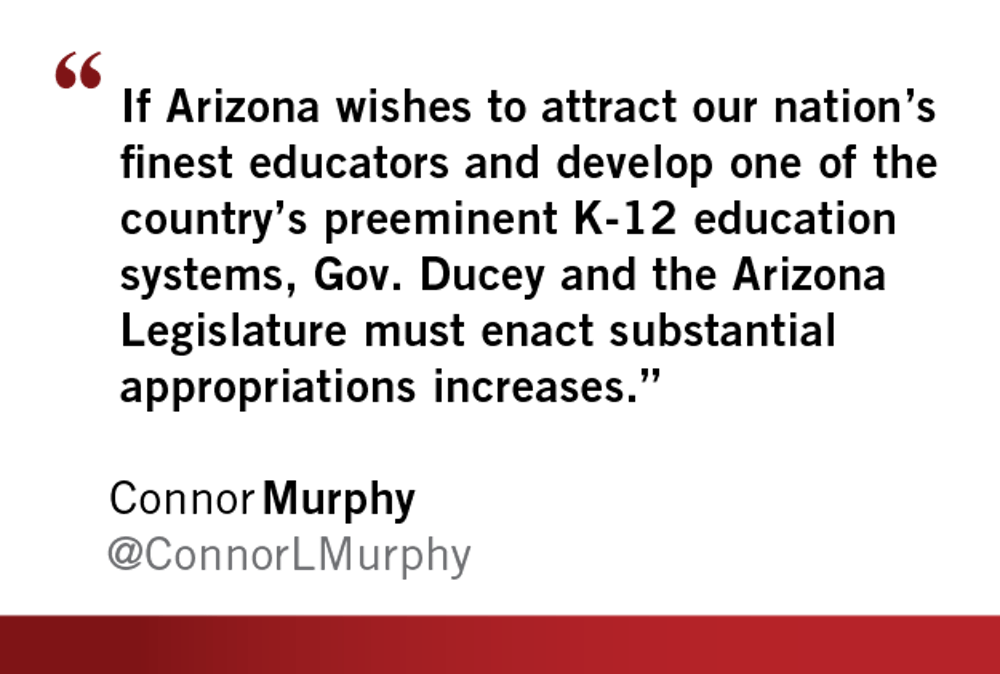As Doug Ducey took the Oath of Office last week and became the 23rd Governor of Arizona, the former Coldstone Creamery CEO took the reins of a state in dire need of public education reform. Although Ducey’s predecessor, Jan Brewer, was actively engaged in improving Arizona’s K-12 education system, our state remains woefully behind other states with Republican administrations. Unfortunately, our new Governor’s inaugural address gave concerned citizens little reason to hope for improvement in the future, and inspired a new appreciation for Brewer simply for trying.
Arizona’s struggles to develop a strong public education system are not breaking news. Recent 2014 rankings indicate that Arizona’s K-12 education system ranked only 43rd out of all 50 states; the rankings took into account factors such as reading and writing proficiency, student to teacher ratio and school safety. Although these findings are upsetting, Arizona's historical inability to alter its poor ranking is even more discouraging. When Brewer took office in 2008, Arizona’s public education system was similarly poorly ranked, with teacher compensation and Department of Education funding lagging behind other states according to the National Education Association.
Brewer, whose political career was inspired by her dissatisfaction with her daughter’s school board, was often a champion of fiscal conservatism during her time as governor. Like many Republican governors following the recession, Brewer cut spending across departments; she was notable among her Republican peers for repeatedly attempting to institute a system of performance-based funding increases for highly achieving public schools.
The Arizona Ready Report Card, an online database with easily accessible information regarding Arizona public school enrollment and student performance, was also developed under Brewer in 2012. In spite of our state’s poor education ranking in 2014, Brewer can at least be given credit for instituting initiatives that have the potential to put our state on the right course.
The unfortunate reality which Arizonans face in 2015 is that the governor we elected, Ducey, is unlikely to improve our already poor public education system. In fact, he is likely setting the state on track to make the current education situation worse.
The crux of Ducey’s educational policy, and perhaps even his entire perspective on governance, is decreasing unnecessary government funding and interference. Accordingly, Ducey supports an appeal of a court ruling that mandates the state increase public school funding by over $300 million dollars annually. A closer examination of states with highly successful public education systems reveals that decreasing funding for education is exactly the opposite of what states should do.
In the aforementioned education ranking findings, the school system of another state with a Republican governor — New Jersey — received the highest ranking. More than $9 billion of state funding were directed towards public education in New Jersey, with an additional $5 billion allocated towards a new Education Innovation Fund, according to the New Jersey Fiscal Year 2014 Budget.
According to the Arizona Legislature’s 2013 Appropriations Report, the Arizona Department of Education only received agency totals approaching $3.5 billion. Although decreasing taxes — and as a result allocations of public funding towards education — may earn political points in the wake of our nation’s most recent recession, these actions are contrary to effective education reform and improvement.
Much like Brewer before him, Ducey’s education policy is instead primarily ideologically driven; during his campaign for governor, Ducey advertisements prominently featured the candidate’s commitment to expanding programs in civics and American history at the K-12 level rather than increases in funding. This policy is particularly significant now due to the re-emergence of one of the most contentious educational debates of Brewer’s tenure; controversial ethnic studies classes in the Tucson Unified School District have once again entered the spot light, as the decision to ban these classes is appealed.
Ducey is likely to support a ban of such classes, in spite of our state’s significant Latino population. More importantly, citizens across the state need to recognize that without increased funding, Arizona’s educational system is destined to decline, regardless of the outcome of this legal battle.
Upon taking office in 2008 following Janet Napolitano’s appointment to head the Department of Homeland Security, Brewer inherited a downtrodden public education system. Today, Ducey has inherited a similarly poor public education system. While Gov. Brewer at least developed some initiatives to redirect Arizona public education’s downward spiral, Gov. Ducey’s commitment to decreasing taxes (and, accordingly, cutting into public education funding) will only further harm our state’s already poor public education system.
If Arizona wishes to attract our nation’s finest educators and develop one of the country’s preeminent K-12 education systems, Gov. Ducey and the Arizona Legislature must enact substantial appropriations increases, as other states with more successful public education systems have done. Unfortunately, such increases appear unlikely under the Ducey Administration, and a decrease in the quality of our already deplorable public K-12 education appears more likely by the day.
Reach the columnist at burmasamoa@asu.edu or follow @ConnorLMurphy on Twitter
Editor’s note: The opinions presented in this column are the author’s and do not imply any endorsement from The State Press or its editors.
Want to join the conversation? Send an email to opiniondesk.statepress@gmail.com. Keep letters under 300 words and be sure to include your university affiliation. Anonymity will not be granted.
Like The State Press on Facebook and follow @statepress on Twitter.





